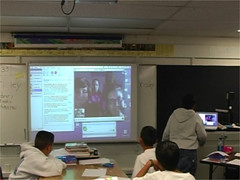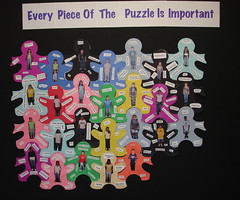Recently we’ve been seeing posts and comments discussing web 2.0 applications. Arguments about whether we should be calling these applications “Web 2.0” as well as discussions about the educational value of some or all of these applications and whether we should be using them at all. Even the old, “kids can’t read or do basic math, so teaching them anything but those subjects is a waste of time,” saw has been revived. Some are even throwing up heir hands and wondering if technology use in school has run it’s course – maybe its been tried and failed to make a difference a few have wondered.
Some of this discussion seems an attempt by some to get us to “swing at pitch in the dirt” – waste our time. Call this what you want “Web 2.0” – “The Read/Write web” – whatever. To me unless the complainers want to come up with another term to use to refer to it – but we need some common language so we can discuss things.
To those questioning if using tech and web 2.0 tools are valuable, have “run their course and proved to be deficient” I disagree. Over the last 10 or 20 years or more “Those People” have been claiming that this approach or that method or curriculum has been tried and failed. But I have rarely seen any program in any subject really implemented well – quality training and support and resources over a period of years – probably at least 3 to 5 years – and more than a couple of classrooms or 1 school. I’ve seen it happen a few times, but by and large things are implemented and supported poorly, have varied at best results and therefore “the implementors” (read teachers) are frustrated and tweak “the program” to make it doable for the duration and hopefully the next thing will be implemented better or not require much support somehow and still do a quality job. I speak as an elementary teacher that has to deal with a new curriculum adoption or program almost every year (sometimes more than one). We are promised the moon and the stars in terms of training and support and usually get the swamps. I believe you cannot assume tech integration or project based – problem based models have been tried and failed because I think they have never been tried on a wide enough scale nor given the time and dollars to polish – as I stated earlier, I believe that is true of almost every curriculum adoption/teaching method implemented in my 26 years of teaching (with a few exceptions).
I do pretty well with using tech as a tool to help me teach and my students to learn, but how much better a job would I be doing if there were 3 or 5 or 10 or more teachers on my staff that were doing this too? How much would we learn from each other about our craft? But until recently I’ve been pretty much on my own and having to swim against the current to even do what I’ve done. My school has been obtaining a fair amount of technology the last year or so – and we have done more workshops in the last year about its use in teaching than we have done in the last 10 years, but that’s still not much. And the vast majority of teachers are still early adopters – how much can we expect at this point? Now throw into the mix changing how we do school beyond just incorporating these tools – but doing things differently and using them to have kids construct their learning and teaching them to think and build the schema so many lack (and again I come at this as an elementary teacher at a very at risk school).
I used Flickr last year a fair amount and was very pleased how its ease of use helped engage my students in writing and also incorporating photos into their poetry, writing about science and social studies – ooh! and reading and math too. I look forward to using it more this year. But I doubt 2% of teachers have ever heard of it much less seen effective use of it.
Wikis, both as something my students used to speed their search for information on the web, but also as a place to design and archive and build their learning were invaluable this past year and again we’ve covered some of my students’ learning curve on using wikis, so I look forward to this coming year when we can continue.
Digital video – hmmm students storytelling and being creative and writing and editing and storyboarding and analyzing their work and redoing it and making it better and learning vocabulary – are those things we want kids doing? And now we can share their work with the world on TeacherTube and other locations.
But again how many teachers have experienced digital video as a learning tool?
Blogging – do I need to explain how its valuable? When I ask at trainings still about half have never heard of them and 90% have never seen one.
All of these tools, when used well are engaging and involve students in real world use of the skills they are supposed to be learning in school anyhow.
Why haven’t teachers engaged with tech? Time, fear – of tech and of straying from what was/are “acceptable teaching” strategies. In the era of NCLB teachers have been pressured to do things in the box which hasn’t fostered much expertise of thinking outside the box. Teachers aren’t paid much and so one of the things they get from teaching is prestige – being thought of as doing a good job – if I stray from “the program” I might be labeled as not being a good teacher, that’s risky.
Learning is messy!
Blogged with Flock
 The K12 Online Conference will probably have started by the time you read this – with David Warlick’s keynote. From the conference web site:
The K12 Online Conference will probably have started by the time you read this – with David Warlick’s keynote. From the conference web site:


